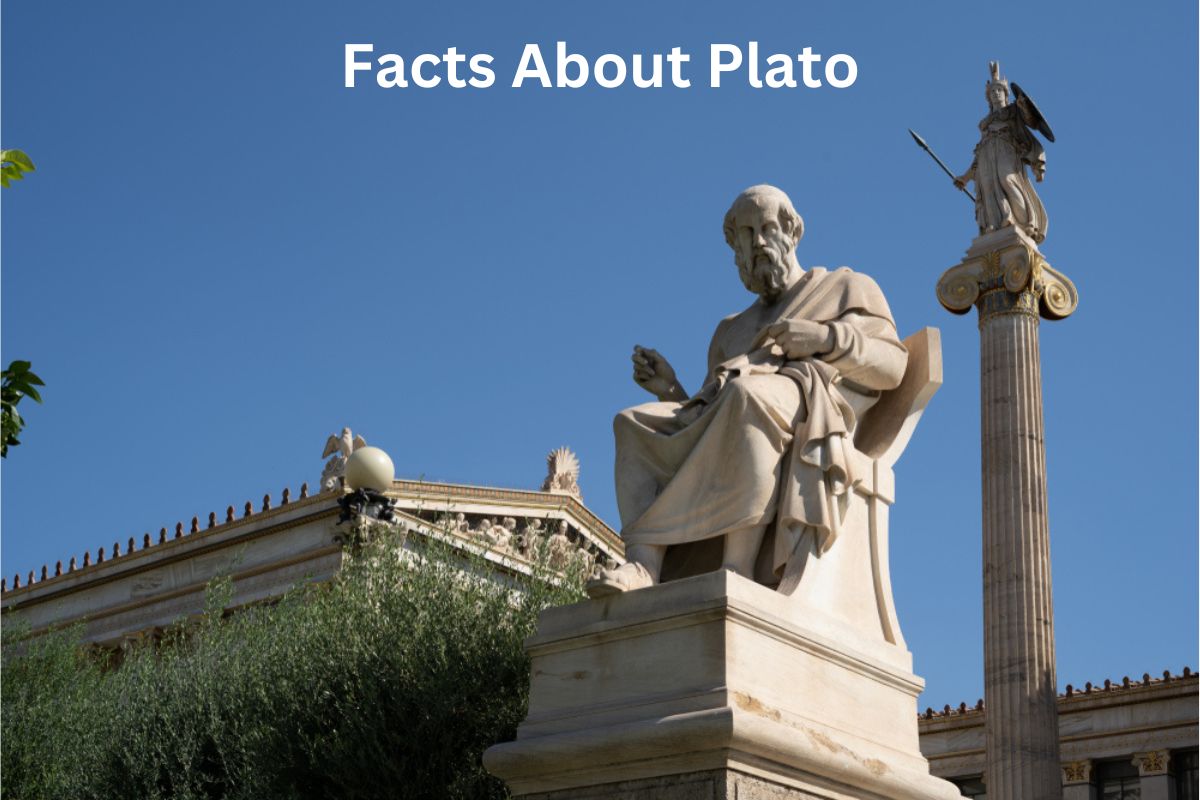Plato, an ancient Greek philosopher and mathematician, was born in Athens around 428/427 BCE. He was a student of Socrates and went on to become one of the most influential thinkers in Western philosophy.
Plato founded the Academy, the first institution of higher learning in the Western world, where he taught and engaged in intellectual pursuits. His works, including “The Republic” and “The Symposium,” explored diverse topics such as justice, metaphysics, ethics, and the nature of love.
Plato’s philosophy centered around the existence of a higher realm of unchanging Forms and the pursuit of wisdom and virtue.
His ideas continue to shape philosophical thought and have left a lasting impact on Western civilization. Plato passed away around 348/347 BCE, but his legacy as a philosopher and scholar lives on.
Plato Facts
1. Plato was an ancient Greek philosopher and mathematician
Plato was an ancient Greek philosopher and mathematician who lived from around 428/427 BCE to 348/347 BCE. He was born in Athens, Greece, during a time of political and intellectual flourishing.
While there is some uncertainty about the exact dates of his birth and death, his contributions to philosophy and his influence on subsequent thinkers are well-documented.

2. Plato was born into an aristocratic family in Athens, Greece. His birth name was Aristocles, but he received the nickname “Plato”
Plato, originally named Aristocles, received the nickname “Plato,” which means “broad” or “wide,” possibly due to his broad shoulders or a broad forehead. The name Plato stuck with him throughout his life, and he is known by this name today.
Also Read: Plato Accomplishments
Despite coming from an aristocratic family, Plato was drawn to intellectual pursuits rather than pursuing a political career, which was more typical for individuals of his social status.
3. Plato founded the Academy in Athens, which is considered the first institution of higher learning in the Western world
Plato established the Academy in Athens, which is recognized as the first institution of higher learning in the Western world. The Academy was founded around 387 BCE and operated for nearly 900 years, until its closure in 529 CE by the Byzantine Emperor Justinian I.
Also Read: Timeline of Plato
The Academy provided a structured environment for intellectual pursuits and facilitated the study of various disciplines, including philosophy, mathematics, science, and political theory.
It served as a hub for scholars and philosophers to engage in rigorous intellectual dialogue, debate ideas, and advance knowledge. The Academy played a crucial role in shaping the intellectual landscape of ancient Greece and laying the foundations for Western philosophical traditions.
4. One of Plato’s most famous works is “The Republic,” in which he presents his ideal society
One of Plato’s most famous and influential works is “The Republic” (Greek: “Politeia”). In this dialogue, Plato presents his vision of an ideal society.
The book explores a wide range of topics, including the nature of justice, the structure of an ideal city-state, the roles and education of citizens, and the nature of the philosopher-king.
Plato’s Republic introduces the concept of the philosopher-ruler, who possesses wisdom and virtue and is best suited to govern and lead society. The work has sparked countless discussions and interpretations and remains a cornerstone of political philosophy.

5. Plato’s philosophical beliefs were heavily influenced by his teacher, Socrates
Plato’s philosophical beliefs were deeply influenced by his teacher, Socrates. Socrates’ method of questioning, known as the Socratic method, had a profound impact on Plato’s philosophical approach.
Like Socrates, Plato believed in the importance of questioning, critical thinking, and the pursuit of truth. Many of Plato’s dialogues feature Socrates as the main character, engaging in dialogues with other individuals to explore various philosophical concepts and examine the nature of knowledge, morality, and existence.
6. Plato believed in the existence of a higher realm of reality, which he called the “Forms” or “Ideas”
Central to Plato’s philosophy is the concept of the “Forms” or “Ideas.” Plato argued that the physical world we perceive with our senses is merely a flawed and transient reflection of a higher realm of perfect and eternal Forms.
These Forms represent the essential and unchanging nature of things, such as beauty, justice, and goodness. According to Plato, true knowledge can only be obtained through the contemplation and understanding of these Forms.
The theory of Forms had a significant influence on subsequent philosophical and metaphysical thought.
7. In his dialogue “The Symposium,” Plato discusses the nature of love and presents the idea of “Platonic love”
In his dialogue “The Symposium,” Plato explores the nature of love. The dialogue takes the form of a series of speeches given by different characters at a banquet. Plato presents the idea of “Platonic love,” which goes beyond physical attraction and encompasses a spiritual and intellectual connection.
Platonic love is seen as a higher form of love that transcends the individual and seeks to elevate the soul towards truth, beauty, and the Forms. This concept of love has had a lasting impact on philosophical and cultural discussions surrounding the nature of relationships and the pursuit of higher ideals.
8. Plato’s philosophical writings cover a wide range of topics
Plato’s philosophical writings cover a wide range of topics and disciplines. In addition to metaphysics and ethics, Plato delved into areas such as epistemology (the theory of knowledge), politics, aesthetics, and the nature of the soul.
His dialogues tackle diverse subjects, including the nature of reality, the existence of the soul, the nature of virtue, the relationship between knowledge and opinion, the role of art in society, and the ideal form of government.
Plato’s comprehensive exploration of these subjects contributed to the development of Western philosophy and provided a framework for subsequent philosophical inquiry.
9. Plato’s metaphysical theory of the “Allegory of the Cave” illustrates his belief in the existence of a higher reality
One of Plato’s most renowned allegories is the “Allegory of the Cave.” Found in Book VII of “The Republic,” this allegory serves as a metaphor for Plato’s metaphysical and epistemological ideas.
In the allegory, prisoners are chained inside a dark cave, facing a wall. They can only see the shadows of objects projected on the wall, which they mistake for reality.
Plato suggests that the philosopher, representing the enlightened individual, is like someone who escapes the cave and ventures outside into the sunlight, where he sees the true forms and gains knowledge of the higher reality.
The allegory highlights Plato’s belief in the existence of a transcendent realm of Forms and the transformative power of philosophical enlightenment.
10. Plato’s theory of knowledge, known as “Platonic epistemology,” argues that true knowledge is not derived from the senses but is acquired through reason and contemplation of the Forms
Plato’s theory of knowledge, known as “Platonic epistemology,” posits that true knowledge is not derived from the senses but is acquired through reason and contemplation of the Forms. According to Plato, the senses can deceive us, and the physical world is subject to change.
True knowledge, in his view, is based on the understanding of the unchanging and universal Forms. Plato distinguished between opinion (doxa) and knowledge (episteme), asserting that genuine knowledge arises from the grasp of the eternal and unchanging truths.
11. Plato’s philosophical system also encompassed his views on ethics
Ethics played a significant role in Plato’s philosophical system. He believed that the ultimate goal of human life was the pursuit of virtue and the cultivation of wisdom.
Plato argued that virtue, such as justice, courage, and wisdom, is inherent in the soul and can be nurtured through proper education and philosophical inquiry. He emphasized the importance of harmonizing the different parts of the soul, with reason governing over the spirited and appetitive aspects.
Plato’s ethical framework aimed at achieving a balanced and virtuous life, aligning personal conduct with the higher truths of the Forms.
12. Plato’s political philosophy emphasized the importance of justice and the common good
Plato’s political philosophy is expounded in works such as “The Republic” and “The Laws.” He proposed an ideal society governed by philosopher-kings, individuals who possess both intellectual wisdom and moral virtue.
According to Plato, only philosopher-kings, who have transcended their personal desires and possess a deep understanding of the Forms, can effectively govern a just and harmonious society.
Plato’s vision of the ideal state emphasized the importance of justice, communal living, and a hierarchical structure guided by reason and wisdom.
13. Plato’s philosophical ideas have had a lasting influence on Western thought
Plato’s philosophical ideas have had a profound and enduring influence on Western thought. His works continue to be studied, debated, and interpreted by scholars and philosophers across different cultures and time periods.
Plato’s dialogues, with their captivating characters and thought-provoking discussions, have shaped the development of philosophy, politics, education, and various fields of knowledge.
His enduring legacy lies in his contributions to metaphysics, epistemology, ethics, political theory, and the exploration of the nature of reality, truth, and human existence.
Plato’s ideas have permeated Western intellectual traditions and continue to inspire contemporary philosophical inquiries and reflections on the human condition.
